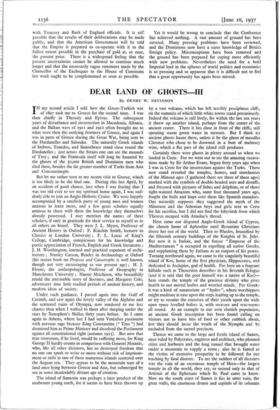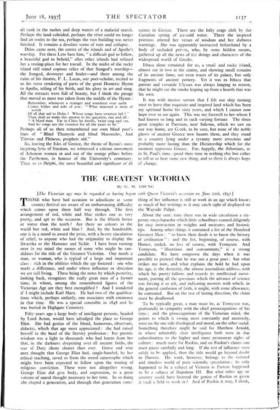DEAR LAND OF. GHOSTS III
By HENRY W. NEVINSON
But let me rather turn to my recent visit to Greece, which is too likely to be the final one. During this last April, by an accident of good chance, just when I was fearing that I was too old ever to see my spiritual home again, I was sud- denly able to join an Anglo-Hellenic Cruise. We were happily accompanied by a smallish party of young men and women anxious to learn more, and a few great scholars equally anxious to share with them the knowledge they theniselves already possessed. I may mention the names of these scholars, if only in gratitude for their service to myself as to all others on board. They were J. L. Myres, Professor of Ancient History in Oxford ; F. Kinchin Smith, lecturer in Classics at London University ; F. L. Lucas of King's College, Cambridge, conspicuous for his knowledge and poetic appreciation of French, English and Greek literatures ; J. H. Worthington; learned and practical exponent of archi- tecture ; Stanley Casson, Reader in Archaeology at Oxford (his recent book on Progress and Catastrophe is well known, though not very encouraging to our present S age) ; H. J. Fleur; the anthropologist, Professor of Geography in Manchester University ; Naomi 'Mitchison, who beautifully retold the irresistible story of Socrates, and Margaret Cole; adventurer into little studied periods of ancient history, and modern ideas of society.
Under such guidance, I passed again into the Gulf of Corinth, and saw again the lovely valley of the Alpheus and the scattered ruins of Olympia, now rendered to me less chaotic than when I walked to them after sleeping 'under the stars by Xenophon's Skillus forty years before. So I came again to Athens, where last I had seen Venizelos passionate with nervous rage because King Constantine (" Tino ") had dismissed him as Prime Minister and dissolved the Parliament against all constitutional right (autumn 1915). • But now that true statesman, if he lived, would be suffering more, for King George II hardly counts in comparison with General Metaxis, who, like all other dictators, has so destroyed freedom that no one can speak or write or move without risk of imprison- ment or exile to one of those numerous islands scattered over the Aegean sea. They appear to be the mountain tops of a land once lying between Greece and Asia, but submerged by sea in some incalculably distant age of creation.
The island of Santorin was perhaps a later product of the exuberant young earth, for it seems to have been thrown up by a vast volcano, which has left terribly precipitous cliffs, on the summits of which.little white towns stand precariously. Indeed the volcano is still lively, for within the last ten years it threw up another . island, perhaps from the centre of the ancient crater. There it lies close in front of the cliffs, still spouting warm green water in torrents. But I think no ancient ghosts haunt there, unless it be the ghost of maudlin Clarence who chose to be drowned in a butt of malmsey wine, which a flat part of the island still produces.
Certainly there were ghosts in plenty around us when we landed in Crete. For we went out to see the amazing excava- tions made by Sir Arthur Evans, begun forty years ago when I was in Crete for the insurrection against the Turks. There now stand revealed the temples, homes, and storehouses of the Minoan ages (I gathered there are three of those ages) marked with the symbols of double-headed axes and distaffs, and frescoed with pictures of fishes and dolphins, or of those tight-waisted Amazons who, some four thousand years ago, fought the bulls and leapt over them like Spanish matadors. One naturally supposes they suggested the myth of the Niinotaitr and the Athenian boys and girls' sent to Crete for his sacrifice, but I did not-find the labyrinth from which Theseus escaped -With Ariadne's thread.
Next came our disputed Att glo-Greek island of Cyprus, the chosen home of Aphrodite until Byzantine Christians drove her Out of the World. Then -to Rhodes, beautified by the fifteenth century buildings Of the Knights Of St. John. But now it is Italian, and the ftiture " Einperor of the. Mediterranean " is occupied in expelling all native Greeks, and supplanting them by Italians as an outpost 'of his power. Turning northward again, we came to the singularly beautiful Wand of KOt, hone of the first-physician, Hippocrates, and dedicated to Atclepios, god of health. For here on a fragrant hillside such as TheOcrittis describes in his Seventh Eclogue (and it is said that the poet himself was a native of Kos)-- here stands the temple of the gracious- divinity who- gives health to our mortal bodies and wearied mina For Greeks it was a kind of sanatorium or " hydrO", where worshippers might meditate:it:ease-Upon the steps-leading-up to the temple, Or try to resume the exercises 'of their'YOUth upon the. wide open space levelled before it, with recesses and rest-rooms all round. As an example to our oWnTsltittisli population, an ancient Greek inscription has been found • calling on visitors not tit leave 'bits of food or other rubbish about, Test they should incur the wrath of the Nymphs and be excluded from the sacred precincts.
Thence we came to the large and fertile island of Samos, once ruled by Polycratei, engineer and architect, who planned cities and harbours and •the long tunnel that brought water under a mountain to supply a town ; also he is famed as the victim" of excessive proiPerity to be followed for our teaching by fatal disaster. To me the saddest of all 'disasters was- the 'ruin of an enormous temple of Hera—the largest temple in all the world, they say,' or second only to that of Artemis of the Epheitaris which -St. Paul came to know. NoW on the south coast of-Samos it-lies in utter 'mid, the great walls, the efiarintais drunis and einitals of its columns all sunk in the rushes and deep waters of a malarial marsh. Perhaps the land subsided, perhaps the river could no longer find an outlet to the sea, perhaps the vast building was never finished. It remains a desolate scene of ruin and collapse.
Delos came next, the centre of the islands and of Apollo's worship. For there Leto bare him, " a difficult god to follow, a beautiful god to behold," after other islands had refused her a resting-place for her travail. In the midst of the rocky island still stand copious relics of that Sungod's worship— the Sungod, destroyer and healer—and there among the ruins of his theatre, F. L. Lucas, our poet-scholar, recited to us his verse rendering of parts of the great Homeric Hymn to Apollo, telling of his birth, and his glory in art and song. All the extracts were full of beauty, but I think the pasage that moved us most was taken from the middle of the Hymn :
Remember, whenever a stranger and wanderer over earth Comes hither and asks of you : " What minstrel is most of worth Of all that sail to Delos ? Whose songs have sweetest fall ? " Then shall 'ye make this answer to his question, one and all : " A blind man. Far in Chios he dwells, 'tWixt crag and sea, And his songs are the sweetest for all the years to be."
Perhaps all of us then remembered our own blind poet's lines of " Blind Thamyris and blind Maeonides, And Tiresias' and Phineus, prophets' old."
So, leaving the Isles of Greece, the theme of Byron's most inspiring lyric of freedom, we witnessed a solemn movement of Athenian women in and out of the orange pillars before the Parthenon, in honour of the University's centenary. Then an to Delphi, the most beautiful and significant of all scenes in Greece. There are the lofty crags cleft by the Castalian spring of ice-cold water. There the inspired priestess uttered her verses of wisdom and her dubious warnings. She was apparently instructed beforehand by a body of secluded priests, who, by some hidden means, gathered up all the news of the doings and characters of the widespread world of Greeks.
Ithaca alone remained for us, a small and rocky island, almost cut in two at the centre, and showing small remains of its ancient fame, not even traces of its palace, but only fragments of ancient pottery. Yet it was to Ithaca that patient and versatile Ulysses was always longing to return, that he might see the smoke leaping up from a hearth that was his own.
It was with intense sorrow that I felt our ship turning west to leave that exquisite and inspired land which has been my spiritual home for sixty years, and which I cannot now hope ever to see again. This was my farewell to her whom I had known so long and in such varying fortune. The three great temples at Paestum, near Salerno, which we saw on our way home, are G. to be sure, but none of the noble ghosts of ancient Greece now haunts them, and they stand in a country lying under a tyranny more atrocious and probably more lasting than the Dictatorship which for the moment oppresses Greece. For, happily, the Athenians, as in St. Paul's time, spend their time in nothing else but either to tell or to hear some new thing, and so there is always hope of change.















































 Previous page
Previous page